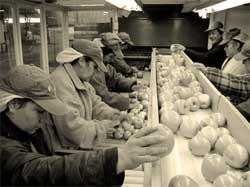Preparing specialists
to evaluate biological
risks
 Research on transgenic Research on transgenic
cultivations has increased in the
last few years. Technical progress
in different areas has produced
a greater efficacy of these
biotechnological applications as
well as in a reduction in costs.
Accompanying this progress is
the necessity to evaluate the
potential risks involved in the
liberation of genetically modified
organisms (GMOs) into the
environment and to have
protocols for their appropriate
management and control,
especially with respect to origin
centers and high diversity sites
of cultivated species. However,
not enough professionals are
prepared in a multidisciplinary
perspective to deal with the
themes related to biological risk
evaluation and management.
In response to this necessity, the
faculty of Forestry Sciences, the
university’s Biotechnology Center,
and the United Nationals
Industrial Development
Organization (UNIDO)
inaugurated, in 2001, a
Biosecurity Diploma Program, the
only academic program in the
world that provides specialization
in this area.
This Diploma Program functions
with a long-distance education
platform and is oriented to
professionals who are responsible
for evaluating biological risks in
the fields of research,
government, and industry, as
well as those related with public
policy design or the legal and
ethical aspects of biotechnology.
Achievements
In one year –with long-distance
work and two in-class modulesthe
program prepares
professionals to formulate GMO
liberation protocols. It also allows
the students to evaluate and
administrate the risks associated
with GMOs; manage and analyze
the exponential growth of the relevant scientific information,
and deal with issues related to
science public policy, government,
industry, and civil society.
The material is structured around
7 thematic modules:
Methodologies for testing and
managing biological risk; Vegetal
biotechnology and its
environmental impacts; Food
security; Industrial and
environmental applications of
GMOs; Perception and
communication of risk;
Regulatory Systems (national and
international norms; and Legal
Aspects and Bioethics.
World-renown specialists form
part of the academic staff of this
diploma program. The team is
integrated by Klauss Amman,
University of Berne (Switzerland),
Moisés Burachick, Conabia
(Argentina), Ananda Chakrabarty,
University of Illinois (United
States), Jonathan Gressel,
Weizmann Institute (Israel),
Graham Head, Monsanto (United
States), and Roger Hull, John
Innes Centre (United Kingdom);
as well as George Tzotzos, UNIDO
(Austria) and Sofía Valenzuela,
Universidad de Concepción,
program coordinators.
In its first version, the Diploma
Program formed 11 specialists.
The second version, functioning
since July, reflects the growing
interest in this area: the program
received 100 applications from
developed and developing
countries. The present version
is presently training 25
professionals from Nigeria, Kenya,
Lithuania, Slovakia, Austria,
United States, Mexico, Cuba,
Ecuador, Guatemala and Chile,
who attend the Global
Biotechnology Forum, which
coincides with the development
of the second module.
This specialization has awoken
interest in the Ministry of
Economy and the National
Environmental Corporation
(CONAMA), which are studying,
with the Program organizers,
ways in which to train some of
their functionaries.
The quality and pertinence of the
Diploma Program is appreciated
by the Global Environmental Fund
(GEF), whose directors are
interested in supporting the
training, in the third version of
this program, of one third of the
individuals are responsible for
the regulatory frameworks in
Latin American countries.
On the other hand, UNIDO is
studying the possibility of
replicating this experience in
Africa and Asia to facilitate the
access of this training to a greater
number of professionals.
Meanwhile, the University is
evaluating the proposal to
transform the program into a
Master’s Degree adding to the
actual program, modules on
Biodiversity and Intellectual
Property. |

